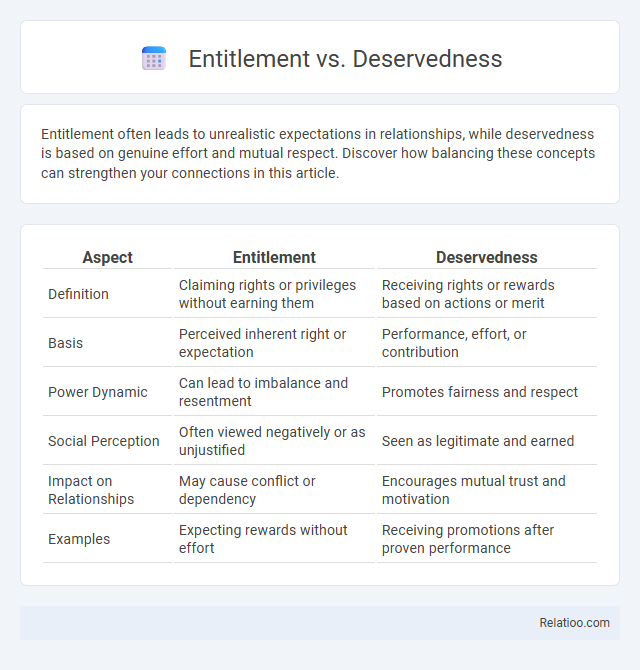Entitlement often leads to unrealistic expectations in relationships, while deservedness is based on genuine effort and mutual respect. Discover how balancing these concepts can strengthen your connections in this article.
Table of Comparison
| Aspect | Entitlement | Deservedness |
|---|---|---|
| Definition | Claiming rights or privileges without earning them | Receiving rights or rewards based on actions or merit |
| Basis | Perceived inherent right or expectation | Performance, effort, or contribution |
| Power Dynamic | Can lead to imbalance and resentment | Promotes fairness and respect |
| Social Perception | Often viewed negatively or as unjustified | Seen as legitimate and earned |
| Impact on Relationships | May cause conflict or dependency | Encourages mutual trust and motivation |
| Examples | Expecting rewards without effort | Receiving promotions after proven performance |
Understanding Entitlement: Definition and Origins
Entitlement refers to the belief that one inherently deserves certain privileges or special treatment, often without corresponding effort or merit. This psychological state can stem from upbringing, societal influences, or personal experiences that shape expectations about rights and rewards. Understanding entitlement's origins is crucial for distinguishing it from deservedness, which is based on earned achievements and justified claims.
What is Deservedness? Key Concepts Explained
Deservedness refers to the recognition or reward a person rightfully earns based on their actions, qualities, or efforts, distinguishing it from mere feelings of entitlement or perceptions of privilege. Key concepts include fairness, merit, and justice, emphasizing that deservedness is grounded in objective criteria rather than subjective expectations. Understanding deservedness helps You assess achievements and rewards in an equitable manner, ensuring acknowledgment aligns with genuine contribution.
Entitlement vs Deservedness: Core Differences
Entitlement refers to a belief that one inherently has a right to certain benefits or privileges, often without consideration of merit, while deservedness is based on earned recognition or rewards stemming from actions or qualities. Entitlement implies expectation regardless of effort, contrasting with deservedness which emphasizes fairness and justification tied to achievements or contributions. Understanding these core differences is crucial in contexts such as workplace recognition, social justice, and personal development.
Psychological Roots of Entitlement
The psychological roots of entitlement stem from early childhood experiences where unmet needs or excessive praise create distorted self-perceptions, leading individuals to believe they inherently deserve special treatment. This contrasts with deservedness, which is based on merit, effort, or moral justification, and entitlement, which can sometimes arise without corresponding achievements or responsibilities. Understanding Your sense of entitlement requires examining these cognitive and emotional patterns to foster healthier self-awareness and personal growth.
The Role of Merit in Deservedness
Merit plays a crucial role in deservedness by linking outcomes to individual effort, skills, or achievements, distinguishing it from mere entitlement which may be granted without performance criteria. Deservedness implies a system of fairness where rewards reflect personal contributions and qualifications. This merit-based approach fosters motivation and accountability, emphasizing that benefits should be earned rather than assumed.
Social and Cultural Influences on Entitlement
Social and cultural influences shape individuals' sense of entitlement by establishing norms and values that define what people believe they have a right to receive. Cultural background, socioeconomic status, and community expectations contribute to varying perceptions of deservedness, often affecting access to resources and social opportunities. These influences can reinforce or challenge entitlement beliefs, impacting social behavior and interpersonal dynamics within diverse groups.
Examples of Entitlement in Everyday Life
Entitlement often appears in everyday life when individuals expect special treatment without corresponding effort, such as demanding promotions or discounts simply based on tenure rather than performance. Deservedness, by contrast, reflects achievements earned through hard work, like receiving a raise after exceeding sales targets. Recognizing Your entitlement mindset helps foster fairness and accountability in personal and professional relationships.
Deservedness in the Workplace and Careers
Deservedness in the workplace hinges on your skills, contributions, and consistent performance, distinguishing it from mere entitlement or arbitrary entitlement. Employers reward deservedness through promotions, raises, and recognition, reflecting tangible value rather than unearned claims. Cultivating deservedness enhances career growth by aligning efforts with organizational goals and earning respect from peers and leadership.
Impact of Entitlement on Relationships
Entitlement in relationships often leads to unrealistic expectations and one-sided demands, causing frustration and resentment between partners. Unlike deservedness, which is based on mutual respect and fairness, entitlement fosters a sense of superiority that undermines trust and emotional connection. Addressing entitlement requires open communication and empathy to restore balance and promote healthier interactions.
Fostering a Healthy Balance: Moving Beyond Entitlement
Fostering a healthy balance between entitlement, deservedness, and genuine need requires recognizing the distinctions between what individuals believe they are owed and what they have rightfully earned. Emphasizing earned achievements and personal responsibility cultivates motivation and fairness, reducing the negative impacts of entitlement mentality. Encouraging self-awareness and gratitude supports a mindset that values deservedness while preventing entitlement from undermining social and professional dynamics.

Infographic: Entitlement vs Deservedness
 relatioo.com
relatioo.com